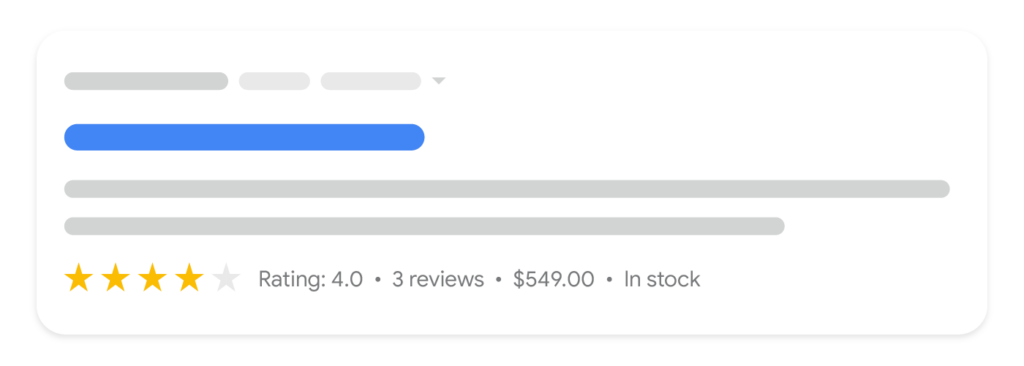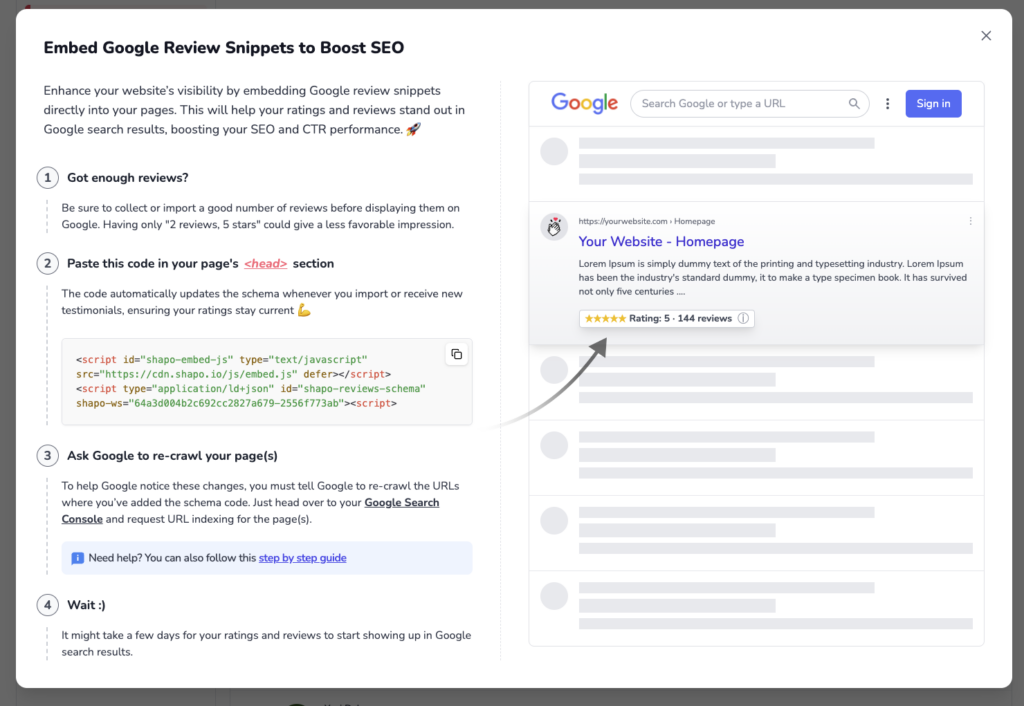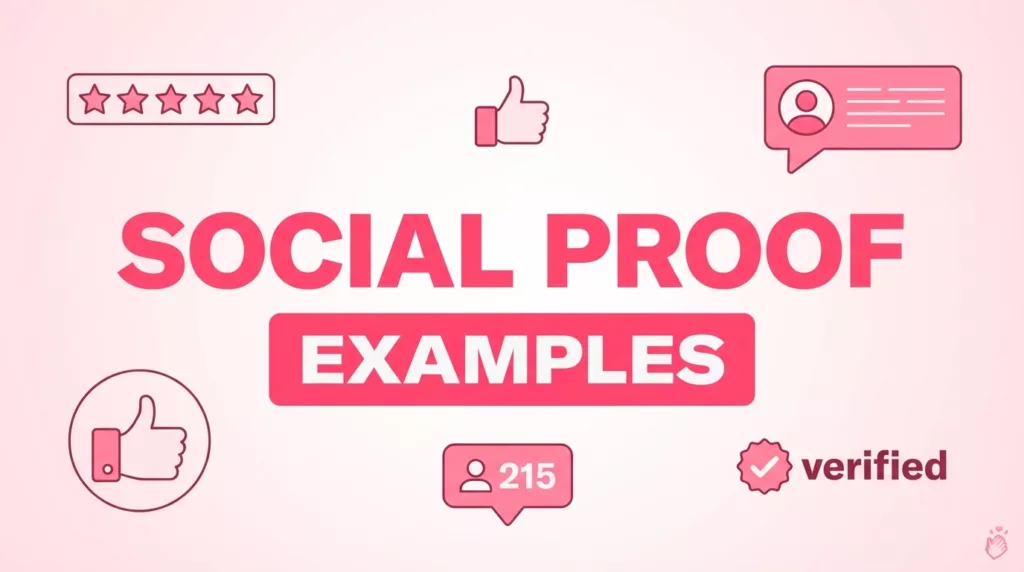
Standing out in search engine results is crucial to online success. With competition constantly increasing, it’s more important than ever to ensure your website is not just visible but also appealing to potential customers. That’s why we’re excited to introduce our latest feature: Review Schema Markup. This tool makes it easy to improve your visibility by adding review snippets to your search engine result pages (SERPs), which can help attract more visitors to your site.
Understanding Review Schema Markup
To fully appreciate the impact of review schema markup, it’s essential to understand what it is and how it works. Review schema markup is a type of structured data markup that you add to your website’s code. This markup tells search engines like Google that your content includes reviews or ratings and provides detailed information about those reviews, such as the aggregate rating and the number of reviewers.
When search engines like Google crawl your site, they use this information to display review snippets in search results. These snippets often include star ratings, the total number of reviews, and sometimes even excerpts from individual reviews. This makes your website’s listing much more engaging and informative at a glance, which can significantly boost your click-through rates (CTR).
For example, imagine a user searching for a “local business” that provides a specific product or service. They see several search results, but one of them stands out because it includes a star rating and a review count. Naturally, they’re more likely to click on that result because it immediately communicates trust and credibility.
The Importance of Structured Data Markup

Structured data markup is a way of labeling your website’s content so that search engines can better understand and categorize it. While review schema is just one type of structured data, it’s incredibly powerful for websites that rely on customer feedback. By adding review schema, you’re effectively telling search engines, “This content includes reviews that should be highlighted in search results.”
But why does this matter? When you add structured data to your site, you’re not just improving the way it’s indexed by search engines; you’re also enhancing the way it’s presented to users. Search engines like Google aim to provide the best possible experience for users, and that includes showing them the most relevant and useful information in SERPs. Review snippets are a prime example of this, as they give users valuable insights into a product or service before they even click through to the site.
Introducing Shapo’s Review Schema Generator

To help our users take full advantage of review schema markup, we’ve developed a review schema generator that simplifies the process of adding this powerful tool to your website. This new feature is designed to be user-friendly, making it accessible even if you don’t have a technical background.
Here’s what you can do with Shapo’s review schema generator:
- Generate Review Schema Markup: Automatically create the necessary markup code for your reviews. This code is essential for ensuring your reviews are properly displayed in search results.
- Customize Your Aggregate Rating: Our tool allows you to choose how you want your aggregate rating to be displayed. You can include the average rating, the total number of reviewers, or both.
- Test Your Review Schema: Once your schema is generated, it’s important to make sure it’s set up correctly. Shapo’s tool integrates with Google’s Rich Results Test Tool and the Schema Markup Validator to help you verify that your review snippets will be displayed properly.
For detailed steps on how to implement this feature, refer to our comprehensive guide in the Shapo documentation.
Why it is Key to Mark Up Your Aggregate Rating
One of the most valuable aspects of the review schema generator is its ability to create and manage an aggregate rating schema. Aggregating schema involves collecting and combining individual reviews to generate an overall rating for your product or service. This aggregate rating is what’s displayed in your structured data markup, and it’s a critical factor in how your reviews appear in search results.
When users see a high aggregate rating alongside a solid number of reviews, they’re more likely to view your business as trustworthy and worth their time. This can significantly increase your click-through rates (CTR), driving more traffic to your site.
But aggregating schema isn’t just about improving your SERP appearance. It also plays a role in how search engines like Google perceive your site. By providing a comprehensive overview of customer feedback, you’re helping search engines understand the value and quality of your product or service. This can lead to better rankings, as Google and other search engines prioritize content that is both relevant and reliable.
How to Get Started with Shapo’s Review Schema Generator
Using Shapo’s review schema generator is straightforward and efficient. Here’s a step-by-step guide to help you get started:
- Sign Up or Log In to Shapo: Whether you’re using the free plan or a paid plan, you have access to the review schema generator. If you haven’t already signed up, create an account today to get started.
- Collect Customer Reviews: The first step in leveraging review schema is to gather customer reviews. Shapo makes this easy with our user-friendly review collection forms. Whether you’re a local business or an online retailer, collecting genuine feedback from your customers is crucial or add Google reviews or other reviews from over 20 sources.
- Create Review Structured Data Markup: Once you’ve collected enough reviews, it’s time to start creating review structured data markup using our generator. This tool simplifies the process, automatically generating the necessary script type application/ld+json code that you need to embed on your web page.
- Add the Markup Code to Your Web Page: After generating your review schema, the next step is to integrate it into your website. This involves copying the markup code and pasting it into your site’s HTML. If you’re not familiar with HTML, this is a great opportunity to collaborate with your web developer to ensure everything is implemented correctly.
- Validate and Test Your Review Schema: The final step is to ensure your review schema is working as intended. Use tools like Google’s Rich Results Test Tool and the Schema Markup Validator to test your review snippets. These tools will help you identify any errors or issues that need to be addressed, ensuring that your reviews are correctly displayed in SERPs.
The Benefits of Review Schema Markup
Adding review schema markup to your site offers numerous benefits, both for your SEO and for your user experience. Here are some of the key advantages:
- Improved Visibility in Search Results: By displaying review snippets in search results, you can make your website stand out from the competition. Users are more likely to click on a result that includes a star rating and review count, which can lead to increased traffic.
- Enhanced Credibility: A high aggregate rating signals to potential customers that your product or service is well-regarded by others. This can boost your credibility and encourage more users to trust your business.
- Better User Experience: Review snippets provide valuable information at a glance, helping users make informed decisions quickly. This can lead to higher click-through rates (CTR) and better overall engagement on your site.
- Optimized for Search Engines: Search engines like Google prioritize content that is well-structured and informative. By using review schema markup, you’re helping search engines understand your site better, which can improve your rankings and visibility.
- Integration with Knowledge Graph: Review schema markup can also increase the chances of your site being included in Google’s Knowledge Graph, which further enhances your visibility and authority online.
Common Challenges and How to Overcome Them
While using review schema markup is incredibly beneficial, there are a few challenges that users might face. Here’s how to overcome them:
- Technical Implementation: For those without a technical background, implementing structured data markup might seem daunting. However, Shapo’s review schema generator simplifies the process, allowing you to generate the necessary code without needing to understand the intricacies of HTML.
- Validation Errors: Sometimes, your review schema might not be displayed correctly due to validation errors. This is why it’s crucial to use tools like the Schema Markup Validator and Rich Results Test Tool to identify and fix any issues before they affect your SERP appearance.
- Keeping Data Updated: As you collect more reviews, it’s important to keep your aggregate rating schema updated. Shapo makes this easy by allowing you to regenerate your schema whenever new reviews are added, ensuring that your site always reflects the most accurate and up-to-date information.
Realize the Benefits Today
By incorporating review schema markup and aggregating schema into your website, you can significantly enhance your online presence. Not only will this improve your visibility in search results, but it will also help you build trust and credibility with potential customers.
With Shapo’s new review schema generator, adding and managing review schema has never been easier. Whether you’re a local business looking to attract more customers or an e-commerce site aiming to boost sales, this tool can help you achieve your goals.
For more detailed guidance on setting up Shapo’s Google Reviews Schema feature, visit our step-by-step guide.
Ready to see your site shine in the SERPs? Signup for Shapo today and start using our review schema generator to optimize your website for search engines and attract more




